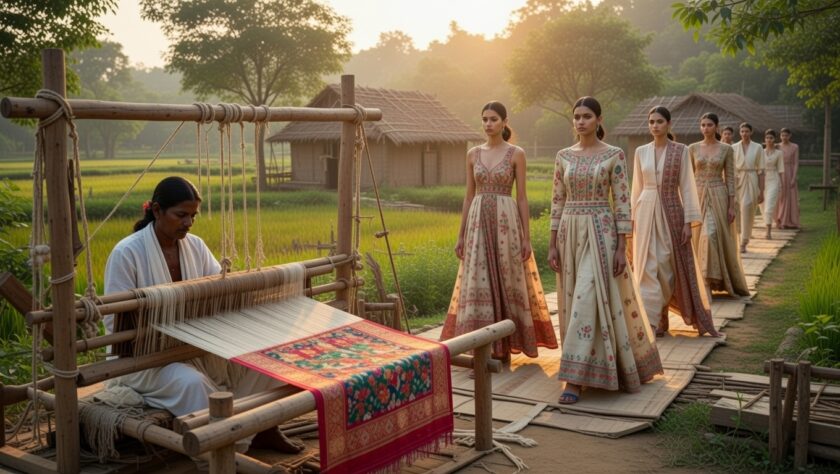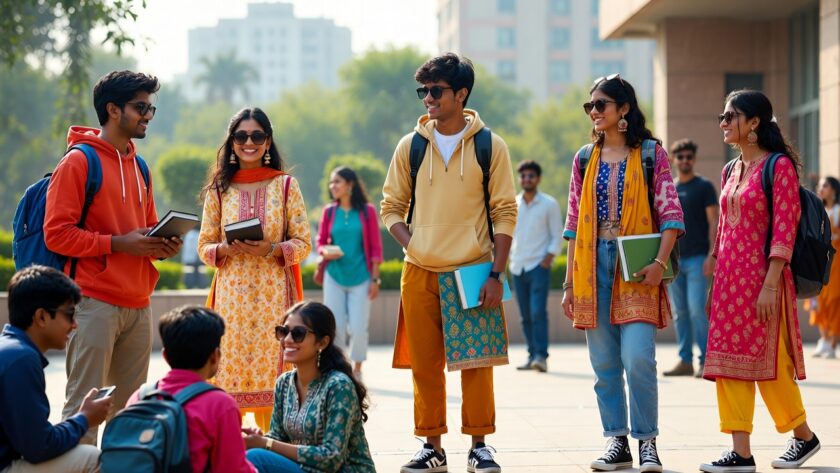Lucknow: In Lucknow, the city of nawabs and rich cultural heritage, Khadi is not just a fabric—it’s a symbol of tradition, sustainability, and modern fashion. Once the emblem of India’s freedom struggle, Khadi has woven its way into the heart of Lucknow’s fashion scene, blending heritage with contemporary style.
Beyond its aesthetic appeal, Khadi is emerging as a unique business model, empowering artisans, promoting sustainability, and captivating the youth. Here’s how Lucknow is spinning this timeless fabric into a vibrant fashion statement and a sustainable business revolution, with insights from designers, artisans, and industry leaders.
Khadi as Lucknow’s Fashion Symbol
Khadi’s resurgence in Lucknow is a testament to its versatility and timeless charm. From traditional kurtas to high-fashion lehengas, designers are reimagining Khadi with modern cuts, natural dyes, and innovative patterns. Events like the 7-Day Khadi Mahotsav at Indira Gandhi Pratisthan, inaugurated by Uttar Pradesh Chief Minister Yogi Adityanath, showcase this evolution. The event featured 133 stalls from five states, including Uttar Pradesh, and collections by renowned designers like Rosy Ahluwalia, Shravan Kumar, Sabyasachi Satapathy, and Aditi Jaggi Rastogi. These designers are blending Khadi with contemporary aesthetics, making it a staple for both everyday wear and high-end fashion.
Aditi Jaggi Rastogi, a Lucknow-based designer who received the Resham Ratna Award, says, “This collection is made with natural dyes and prints. The entire show is an amalgamation of fashion, Indian culture, textiles, and arts and crafts with a soulful purpose.” Her showstopper, bureaucrat Ritu Suhas, embodied the elegance of Khadi, proving its appeal across generations.
Khadi’s unique texture and eco-friendly nature make it a favorite among designers. Prakhar Rao, founder of Zero Tolerance, emphasizes, “Khadi is a fabric of great national importance and the West is finding it difficult to replicate.” He highlights its negligible carbon emissions and role in preserving South-Asian cultural heritage.
Local stores like Gandhi Aashram Khadi Bhandar in Nishatganj and Khadi Sadan are becoming go-to destinations for authentic Khadi garments, offering everything from casual tops to intricately designed sarees. These stores elevate Khadi’s status as a fashion icon while supporting local artisans.
Khadi as a Unique Business Model
Khadi’s revival in Lucknow is not just about fashion—it’s a sustainable business model that empowers artisans, promotes ethical consumption, and drives economic growth. The Khadi and Village Industries Commission (KVIC) and the Uttar Pradesh Khadi & Village Industries Board are at the forefront, fostering a grassroots movement that connects rural weavers with urban markets.
Empowering Artisans: Khadi’s hand-spun, hand-woven process provides employment to thousands of spinners and weavers. Khadi Sadan, an online and offline platform, employs 1,582 spinners and 185 weavers, offering them sustainable livelihoods. A customer review on their site reads, “I bought unisex Khadi Joggers for my boyfriend and me. The fitting is awesome, product quality super best. Thanks Khadi Sadan, keep making such good products.” This reflects the growing demand for Khadi and its impact on artisan communities.
Sustainability and Ethical Fashion: Khadi’s low carbon footprint and organic nature align with the global demand for sustainable fashion. Zero Tolerance, a Lucknow-based brand, collaborates with NGOs to support underrepresented weavers, with 95% of their pieces handmade. Rao notes, “As we dive deeper into the idea of South-Asian representation, we want to do things that make a difference on the ground level.”
Government Support and Market Expansion: The Uttar Pradesh government, under leaders like MSME Minister Rakesh Sachan and KVIC Chairman Vinai Kumar Saxena, is aggressively promoting Khadi. Initiatives like the Khadi Mahotsav and Prime Minister Narendra Modi’s “Khadi for Nation, Khadi for Fashion” mantra have boosted sales. Posts on X highlight this growth, with @rishibagree
noting, “Khadi & Village industries sales went up 5x in the last 10 years… turnover has crossed Rs 1.5 lakh cr.”

Innovative Retail and Branding: Brands like Khadi India and Khadi Sadan are leveraging e-commerce to reach younger audiences. Their collections, featuring digital prints and modern silhouettes, cater to millennials. Ujjwal Kumar, CEO of the Uttar Pradesh Khadi Board, shares, “Khadi is now more stylish and comfortable, luring the youth with new research and designs.”
Quotes That Capture Khadi’s Spirit
Mahatma Gandhi: “If we have the ‘khadi spirit’ in us, we would surround ourselves with simplicity in every walk of life.”
Narendra Modi: “When we purchase a Khadi, we are brightening the lives of the lakhs of weavers who toil day and night. Buying a Khadi product is like ushering a Diwali in the homes of the weavers.”
Gaurav Jai Gupta, Designer: “Can anyone revive Indian classical music or Bollywood music? Khadi has been there all along.”
Sweta Tantia, Designer: “Its new-age reinterpretation as a modern yet quintessentially Indian textile has made it very appealing to the millennial generation.”
Why Khadi in Lucknow Stands Out
Lucknow’s Khadi movement is unique because it blends the city’s cultural legacy with modern innovation. The chikankari embroidery, a hallmark of Lucknow’s textile tradition, often adorns Khadi, creating exclusive pieces that marry heritage with sustainability. Designers like Purvi Joshi, who has worked with Khadi since 2012, note, “The comeback of Khadi is absolutely a great thing, especially with our Prime Minister supporting the movement to give our nation’s fabric its fame and pride.”
The business model thrives on community engagement, with events like the Khadi Mahotsav featuring cultural performances by artists like Kathak artiste Kantika Mishra and 3D movie shows by Kuljeet Rajwant Singh, making Khadi a lifestyle choice.
Embrace Khadi, Lucknow’s pride, and be part of a movement that celebrates sustainability, empowers artisans, and redefines fashion. Visit Khadi Sadan or Gandhi Aashram Khadi Bhandar for exclusive collections, or explore online at www.iwearkhadi.in. As Shelly Jyoti, artist and Khadi advocate, says, “Buying just five meters of Khadi can change the life of millions in rural areas.”










